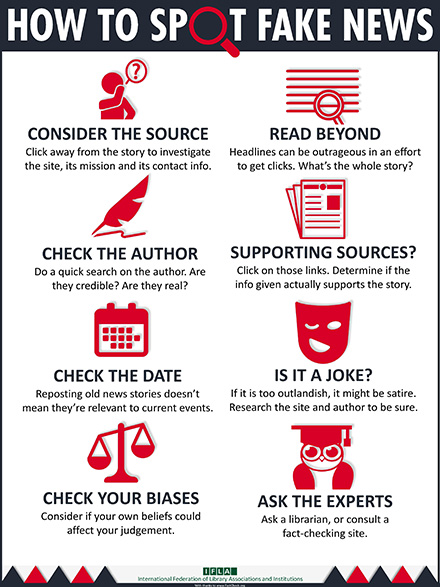Welcome
Technological and online media advancements have made it increasingly difficult to distinguish truthful, reliable information from biased and harmful propaganda. This introductory guide is intended to educate the Pratt community on how to approach and engage with information critically and ethically. Although this guide focuses on how to evaluate online media, we encourage both students and faculty to employ these resources when doing academic research, too.
Topics covered in this guide include key definitions related to information literacy, including misinformation, disinformation, fake news, and more. Print and digital resources for students and faculty are provided, as well as resources related to medical misinformation surrounding the COVID-19 pandemic.
Key Definitions
Information Literacy: A set of integrated abilities encompassing the reflective discovery of information, the understanding of how information is produced and valued and the use of information in creating new knowledge and participating ethically in communities of learning. (via Association of College & Research Libraries)
Bias: An inclination of temperament or outlook, especially: a personal and sometimes unreasoned judgment. (via Merriam-Webster)
Confirmation Bias: The tendency to process information by looking for, or interpreting, information that is consistent with one’s existing beliefs. This biased approach to decision making is largely unintentional and often results in ignoring inconsistent information. Existing beliefs can include one’s expectations in a given situation and predictions about a particular outcome. People are especially likely to process information to support their own beliefs when the issue is highly important or self-relevant. (via Britannica)
Fake News: Fake news is, quite simply, news (“material reported in a newspaper or news periodical or on a newscast”) that is fake (“false, counterfeit”). (via Merriam-Webster)
Misinformation: Incorrect or misleading information. (via Merriam-Webster)
Disinformation: False information deliberately and often covertly spread (as by the planting of rumors) in order to influence public opinion or obscure the truth. (via Merriam-Webster)
Deepfake: An image or recording that has been convincingly altered and manipulated to misrepresent someone as doing or saying something that was not actually done or said. (via Merriam-Webster)
Getting Started
Image sourced from the International Federation of Library Associations and Institutions' (IFLA) informational guide titled "How To Spot Fake News." Accessed March 10, 2021.
Additional Resources:
- A Finder's Guide To Facts: How To Tell Fake News From Real News In 'Post-Truth' Era - National Public Radio (NPR)
- Evaluating News Sources In A Post-Truth World - New York Times
- How To Break Out Of Your Social Media Echo Chamber - Wired

